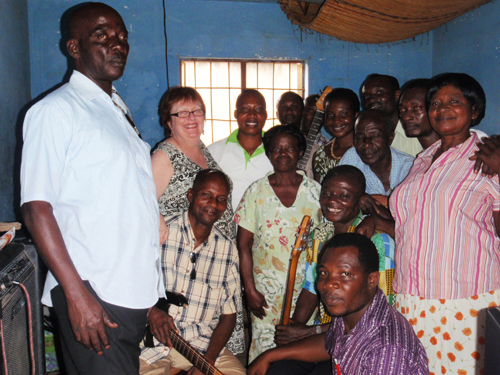
In the year 2000, the adult literacy rate in Ghana was only 57.9 per cent. Almost half the adults in the country couldn’t read or write. In that year, the World Bank began funding a division within Ghana’s ministry of education to provide literacy training for citizens over 15 years of age.
By 2003, the adult literacy rate had climbed to 74.8 per cent.
Then the World Bank dropped its funding, and the percentage of adults in Ghana who could read started to falter again: in 2010, it had fallen to 67.3 per cent.
Teaching people to read and write in Ghana is challenging, says Prof. Jacqueline Murray, director of U of G’s first-year seminars program. She has volunteered in Ghana twice through the Leave for Change program. During one visit, she discovered that the adult literacy program was still being run by the country’s education ministry, despite the loss of World Bank funding. There were still plenty of dedicated staff members; what they lacked were the resources to do their jobs.
“The organization has an astonishing track record,” says Murray. “Most of the staff are highly educated and have postsecondary degrees or diplomas, and they are completely dedicated to the mission.”
The lack of equipment is a serious impediment, however. In one office, Murray found seven people sharing a single computer. The public relations section had no computers at all.
“Ghana is rapidly hurtling forward in development,” says Murray, “but without literacy, the people are missing out in fundamental ways. I’ve heard it said that literacy is essential for democracy. Increasingly, jobs in Ghana require literacy, but it’s also needed in people’s day-to-day lives: being able to read the directions on products, being able to read prices and descriptions in the marketplace, being able to help children with school work.”
Eager to help, Murray got in touch with Rebecca Graham, U of G’s chief information officer and chief librarian, to ask for suggestions. Graham went beyond suggesting; within two days she returned to Murray and offered 125 computers with power cords, mice and keyboards.
“It was serendipity and timing,” says Graham. The library was in the process of replacing the computers used in public workstations, so she was able to arrange for these to be donated. U of G staff checked over each one to make sure they were in good working condition and reset them to factory settings.
Of course, getting the computers donated was only the beginning; getting them to Ghana was the next challenge. “I’d done logistics when I worked for the air force,” says Graham, “so I knew we’d need a container to ship the computers.” Murray was able to find a shipping company in Milton – Allegro Freight – to take on the task and offer a charitable rate. The Zonta Club made a generous donation that covered a large part of the shipping costs to Ghana. Murray’s request for help was facilitated by Michelle Fach, director of the University’s Centre for Open Learning and Educational Support, who is involved with Zonta.
“We had to do a lot of co-ordination and go back and forth to make sure the correct documents were filled out so that the computers could be received without paying taxes and duty,” adds Murray. Shipping the 125 computers cost about the same as buying two new computers in Ghana.
Will the computers help? Graham points out that they did not ship any monitors, so the equipment will have to be matched to monitors in Ghana. Murray adds that internet access is generally available there using plug-in wireless cards. “Just as there aren’t many land lines for phones, there aren’t many networks where you plug your computer in,” she says. If monitors can be acquired, she believes the donated computers will make a huge difference.
While 125 computers were sent to Ghana, the U of G library replaced almost twice that number; the rest went elsewhere on campus.
“For me, this is a different way for the library to contribute to the larger mission of the University,” says Graham. “It’s part of our commitment to community. Technology doesn’t solve problems, but it enables people to find solutions.”
Murray calls it “a true University of Guelph story. It’s what we’re about: changing lives and improving life.” She’s hoping to return to Ghana to see what progress has been made with these new resources and knows she’ll be welcomed. “This is such a phenomenal group of people.”